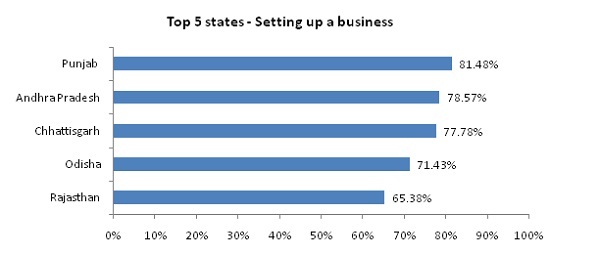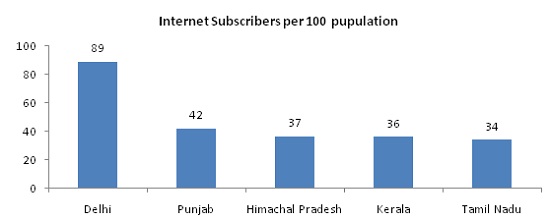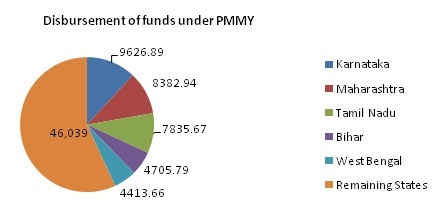
According to the World Bank’s report, India is ranked 130 out of 189 countries in the overall “ease of doing business” ranking. Opening a business in India is much harder than in any of its counterpart BRIC countries. Basic issues like getting credit, electricity, paying taxes and resolving insolvency continue to be sluggish and difficult in India.
In order to provide an impetus to the Indian entrepreneurial landscape, the Government has launched the Start Up India, Stand Up India campaign on January 16. The initiative aims to set up a network of start-ups and provide a new dimension to entrepreneurship in the country. While the government’s launch of this initiative is at a national level, Swaniti Initiative, a non-profit organisation working on data insights, took a closer look at state-level performance to see how various states had adopted a start-up friendly policy.
Researchers delved in to look at variables that are important for businesses and sought to find states that were performing well in these metrics. The findings were as follows:
Registration of companies
| Ranking | States |
| 1 | Maharashtra |
| 2 | Delhi |
| 3 | West Bengal |
| 4 | Karnataka |
| 5 | Tamil Nadu |
Maharashtra accounts for the largest share of new companies registered, followed closely by Delhi. Along with West Bengal, Karnataka and Tamil Nadu, 65.9% of all registered companies have been opened in these five states. At the same time, the north-eastern states of Arunachal Pradesh, Manipur, Nagaland and Mizoram together house less than 1% of total registered companies.
By improving the regulatory framework, the top performing states have been able to provide a relatively conducive environment for entrepreneurial activities.While Delhi and Maharashtra have benefited due to their status as the political, financial and commercial hubs of the nation, Karnataka became the first state to establish a start-up policy with a time frame of 5 years from 2015-2020. The policy entails setting up incubators in post graduate colleges, collaboration between R&D institutions and industry and technical business incubators in higher learning institutions. Similarly, Tamil Nadu has set up a state-level warehouse at Tidel Park in its mission to set aside dedicated areas for start-ups to function.
Being able to create a macroeconomic environment that is inviting for business is considered one of the most important factors for start-ups, according to the World Bank.
Opening a business
States aspiring to promote new businesses have been able to designate a centralised state body which acts a single point of contact for all business start-up licensing. This body is empowered through an explicit mandate to carry out the functions. Andhra Pradesh, Madhya Pradesh, Maharashtra, Punjab, Telangana and Uttar Pradesh have also gone one step ahead and placed the business registration process online to simplify the process of applying for and obtaining registration certificates for entrepreneurs. An assessment study conducted by Department of Industrial Policy and Promotion (DIPP) ranks the top five states on multiple parameters on ease of setting up a business.

The ease of opening businesses consistently marks as one of the most important variables across all major research.
Connectivity
Connecting talent with the required infrastructure helps improve the overall knowledge economy and creates new jobs. As internet connectivity and penetration improves, it plays a major role in boosting job generation and enabling newcomers to start successful business ventures. The top five service areas in terms of internet subscriptions (wired + wireless) every 100 people are Delhi, Punjab, Himachal Pradesh, Kerala and Tamil Nadu. Maharashtra and Karnataka follow closely with a greater internet subscriber base than the other states.

Access to Human Capital
Investing in human capital is an essential activity undertaken by a successful enterprise. Maharashtra, Karnataka, Andhra Pradesh and Kerala have a greater number of colleges per lakh population that cater to their youth. Several of these institutions also host incubation centres under the Technology Incubation and Development of Entrepreneurs (TIDE) scheme implemented by Department of Electronics and Information Technology (DeitY). Out of 27 TIDE centres, nearly 50% have been set up in these states. The ready availability of skilled workforce establishes a strong correlation with the successful launch of start-up missions.

Access to Credit
The Union Cabinet recently approved the setting up of two credit guarantee funds to facilitate loans to micro and small entrepreneurs through MUDRA (Micro Units Development Refinance Agency) and the Stand Up India scheme. The corpus of credit guarantee fund for MUDRA will be Rs 3,000 crore and for Stand Up India Rs 5,000 crore with loans repayable up to 7 years. Banks will also be required to focus on SC/ST and women entrepreneurs in a bid to make the ecosystem more inclusive.
As of January 15, 2016, banks have disbursed Rs. 81,004 crore under the Pradhan Mantri Mudra Yojana benefiting more than 2 crore micro and small entrepreneurs. Karnataka, Maharashtra, Tamil Nadu, Bihar and West Bengal account for 43% of loans made available through the scheme.

As is evident, Karnataka, Tamil Nadu, Maharashtra, Andhra Pradesh and Kerala have been able to create an entrepreneur-friendly system. States, such as West Bengal and Rajasthan have also set up structures to nurture start-ups by launching incubation centres and funding support. The proposed Start Up India, Stand up India scheme can play a big role in extending the start-up culture across the country by promoting the required blend of suitable policies, access to finance, incubation and inclusive ecosystem.
The author is an Analyst at Swaniti Initiative. She is currently working on providing knowledge insights on key government programs to Parliamentarians.